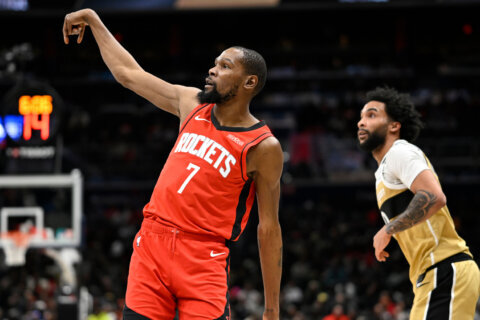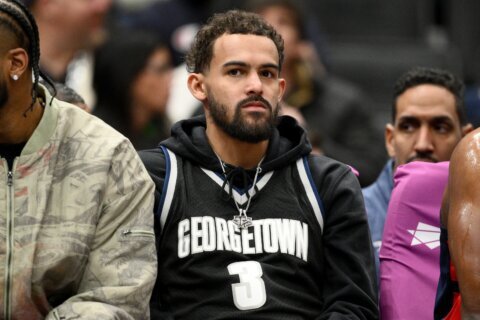Late turnovers cost the Wizards in overtime originally appeared on NBC Sports Washington
The Washington Wizards lost to the Cleveland Cavaliers 117-107 in overtime on Sunday night. Here are five takeaways from what went down…
Cavs are tough
The Cleveland Cavaliers are a good example of how much better the Eastern Conference is now than it was for the better part of the last two decades. Last season, they had the 8th-best record in the East and were eliminated in the play-in tournament. But they then traded for three-time All-Star Donovan Mitchell and they also have a group of young players who are only going to get better.
After beating the Pacers and Bulls to open the year, the bar was raised for the Wizards on Sunday night and they were not able to clear it. They led by 10 early, went down 15, climbed all the way back to force overtime, but were dominated in the final frame. The Cavs outscored the Wizards 14-4 in overtime to secure the win. Washington fell to 2-1 on the season and 1-1 on the road.
One reason why the Wizards lost was free throw shooting. One game after Bradley Beal (27 points) lamented the free throw disparity against Chicago, the Cavs enjoyed a major advantage. They shot 22-for-25 from the line, while the Wizards shot just 9-for-15. Without getting calls, it was even more difficult than usual for them to counter Cleveland’s vaunted defensive front of Jarrett Allen and Evan Mobley Jr.
Mitchell, though, was the true separator. He created distance in overtime with a series of clutch baskets, as the Wizards had no real answer for him. It’s early and the Cavs are designed for contention. The Wizards don’t see them again until February. Maybe things will go differently next time.
Late turnovers
The Wizards coughed the ball up with some ugly turnovers in overtime that will likely leave them shaking their heads on the flight home to D.C. They had 18 turnovers in the game and four in overtime alone. Beal had a bad pass on the baseline, Kristaps Porzingis threw one off the back of the backboard and they had a shot clock violation.
While the Wizards unraveled a bit, they were also facing one of the league’s best defenses. The Cavaliers are well-coached and have the personnel to make it difficult on anybody. It was an example of why the Wizards would like to get their own defense up to speed. Late game stops make the difference between wins and losses.
Avdija on Spida
Deni Avdija’s role is fairly straightforward; he’s the versatile defender in the starting lineup and that means he’s going to get some very difficult assignments from night to night. In this game, he drew the task of guarding Mitchell, whom he memorably stopped on a late-game play last season when Mitchell was with the Jazz.
Avdija had some early success, but man is Mitchell good. He’s so explosive and so crafty, trying to limit him is evaluated on a different grading scale. Mitchell ended up with 37 points, shooting 12-for-29 from the field. He had some highlight plays, like a snatchback dribble three in the second quarter, and also helped Avdija accrue four fouls in his first 11 minutes. It was a learning experience for the third-year pro.
3-point defense
The Wizards had a good night shooting from the outside, an encouraging step for them considering that was an issue last season. But their hot shooting was negated by the Cavaliers finding similar success from long range. The Wizards shot 12-for-28 (42.9%) from deep, but the Cavaliers shot 13-for-33 (39.4%). Mitchell accounted for quite a bit of that, making five threes by himself.
The Wizards should be encouraged by their own 3-point shooting through three games. They are shooting 33-for-85 from deep so far, good for 38.8%. It’s very early and a three-game sample size is nothing in the context of a full season. But that is definitely a good start. One interesting wrinkle, however, is the fact Beal is barely taking any threes. He only attempted one in this game and only has 10 attempts through three games so far.
Each of the last two seasons, he has taken fewer threes per game than the year before. As his percentage has dropped, he has seemingly de-emphasized shooting them, at least slightly. But him averaging 3.3 three attempts per game does not seem like something to expect moving forward.
Hachimura was good
After thriving in the preseason, looking like he was poised for a breakout season, Rui Hachimura topped out at just seven points in the team’s opener against Indiana. He then took a step forward with 12 points in the win over the Bulls. Against the Cavs, he took it up another notch, dropping 16 points off the bench on 7-for-12 shooting from the field and 2-for-3 from three. He did all that in 20 minutes.
Hachimura was the Wizards’ lone bench player with the hot hand early in the game. In the second half, others like Delon Wright and Will Barton started joining in. Both Wright and Barton made key plays down the stretch, including Barton’s steal on Mitchell and fastbreak dunk to force overtime. But all in all, it wasn’t a great night for the Wizards’ second unit on the offensive end. Outside of Hachimura, the other four bench players combined to shoot 38.1% from the field. That wasn’t ideal timing with the starting lineup including Kyle Kuzma (11 points) struggling, Porzingis going cold for the second and third quarters and Beal committing six turnovers.







